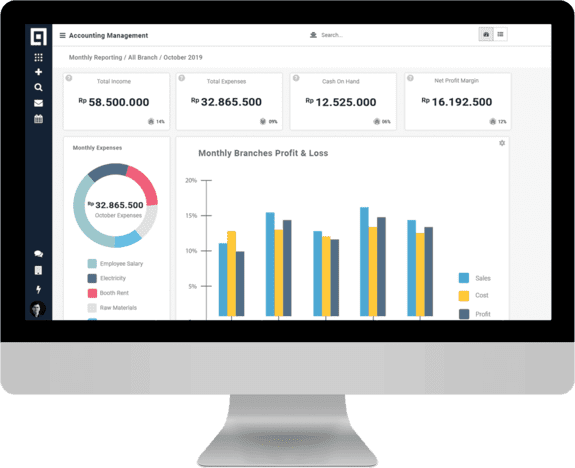Retained earnings are the portion of a company’s net income that remains after dividends are paid to shareholders. These funds serve as a crucial indicator of a business’s ability to reinvest in its operations, support expansion, or reserve resources for unforeseen challenges.
Around 29% of companies now use automated accounts payable systems to improve accuracy, reduce manual effort, and simplify financial calculations like retained earnings by ensuring precise and efficient data management.
HashMicro Accounting Software provides a comprehensive solution for businesses aiming to optimize their retained earnings. This software ensures accuracy and efficiency in managing finances by automating key processes such as profit tracking and financial reporting.
In this article, we will explore the concept of retained earnings in greater depth, discuss their critical role in business operations, and highlight how HashMicro Accounting Software can be a transformative tool in optimizing financial strategies.
Table of Content:
Table of Content

Key Takeaways
|
What Is Retained Earnings?
Retained earnings are the portion of a company’s net income kept after paying dividends to shareholders. They are calculated by adding net income to the previous retained earnings balance and subtracting any dividends paid.
The calculation of retained earnings is straightforward. It begins with the previous period’s retained earnings balance, adds the net income earned during the current period, and subtracts any dividends paid out.
The resulting figure represents the amount of profit retained by the business to support its financial activities. For example, if a company generates $100,000 in net income and distributes $30,000 as dividends, the remaining $70,000 becomes its retained earnings for that period.
Retained earnings play a critical role in ensuring a company’s sustainability and growth. Businesses often rely on these funds to invest in new projects, purchase assets, or address unexpected challenges without relying on external financing.
Effective management of retained earnings reflects a company’s ability to balance shareholder expectations while maintaining the resources necessary for long-term success.
What are Retained Earnings Used for?
Retained earnings play a critical role in a business’s financial strategy. Understanding how retained earnings are used can help businesses allocate their financial resources more effectively.
1. Reinvestment in business operations
Retained earnings are commonly used to fund growth initiatives such as expanding production capacity, upgrading technology, or launching new products. This reinvestment helps businesses enhance their competitiveness and drive long-term profitability.
2. Debt repayment
Companies often allocate retained earnings to pay off debts or settle other financial obligations. Reducing liabilities strengthens financial stability, improves creditworthiness, and minimizes reliance on external financing.
3. Creating financial reserves
A portion of retained earnings is set aside as reserves to handle unexpected expenses or economic downturns. This ensures the business can maintain operations and financial health during challenging periods.
4. Funding strategic projects
Retained earnings can support strategic initiatives, such as entering new markets or acquiring other businesses. These efforts help companies grow and diversify their revenue streams.
By effectively allocating retained earnings, businesses can sustain operations, seize growth opportunities, and prepare for future uncertainties.
What Is the Difference Between Retained Earnings and Dividends?
Understanding the distinction between retained earnings and dividends is essential for grasping how companies manage their profits. While both are directly linked to a company’s net income, they serve different purposes in financial planning and resource allocation.
1. Purpose
Retained earnings represent the portion of net income that a company keeps to reinvest in its operations, repay debts, or save for future needs. In contrast, dividends are the portion of profits distributed to shareholders as a reward for their investment in the company.
2. Impact on financial statements
Retained earnings are reported under the equity section of the balance sheet and accumulate over time, reflecting the company’s financial health and growth potential. Dividends, on the other hand, appear as deductions from retained earnings when they are declared, reducing the amount available for reinvestment.
3. Company control vs. shareholder benefits
Retained earnings benefit the company by providing resources to support expansion, financial stability, and operational needs. Dividends, however, directly benefit shareholders by providing them with a portion of the company’s profits, fulfilling their expectations for returns on investment.
By understanding these differences, businesses can make strategic decisions about how to balance retaining profits for growth with rewarding shareholders through dividends.
The Function of Retained Earnings
Retained earnings serve specific purposes that justify their retention rather than distribution as dividends. Shareholders often agree upon their strategic use to support the company’s financial stability and growth. Below are the key functions and objectives of retained earnings:
1. Financing business operations
Businesses require sufficient cash flow to sustain daily operations and drive growth. Retained earnings provide a reliable source of funding to cover operational expenses, particularly when profits are limited. This use of funds often requires shareholder approval but ensures the company can continue running smoothly with the potential for expansion.
2. Capital reserves
Retained earnings also function as a reserve fund for financial emergencies. These reserves allow the company to address unexpected financial challenges without relying on external loans from third parties like banks, ensuring continued operations during difficult times.
3. Business development
Another critical use of retained earnings is as capital for business development. These funds can support various growth initiatives, from expanding infrastructure to investing in employee development. This dual-purpose use strengthens both the physical and human resources of the company, fostering long-term growth.
4. Debt servicing for businesses
Retained earnings can be effectively used to repay significant business debts. By utilizing these funds for debt payments, companies ensure timely repayments without impacting other funding sources. This approach protects the primary funds of the business while maintaining financial security.
5. The company’s future investment capital
Of course, business owners want a business that is not static or declining but wants growth and innovation to survive and thrive. Another profit-holding advantage is to expand the business or make an investment.
Factors Causing Retained Profit
Several factors contribute to the occurrence of restrained profits, including the following:
1. There is a change in the company’s management
If the company’s control or management changes, existing profits are usually maintained. This is done to allow the new management to adjust and demonstrate the credibility of its financial management. Gains are born in these cases to ensure job stability, suppress acts of suspicion or fraud, and so on.
Utilize HashMicro ERP Software to simplify enterprise management. Software ERP can help your business improve its overall control and visibility. Profit maximization and financial control are more practical and automatic.
2. There was an error in the previous period’s financial statements
Another factor is the occurrence of errors in the financial statements of the previous period. In this case, the company must first improve the financial statements so that they are valid, after which only take into account the value of the earnings statement adequately held.
3. There is an adjustment in the value of the rupiah from the previous period
The adjustment of the SGD value is also an influential factor. The SGD exchange rate can fluctuate at any time, affecting the company’s profit calculation results. Thus, accountants choose to maintain existing profits.
4. Changes in the calculation method
The change in the calculation method can also contribute to retained earnings. For example, if the previous calculation method is always every month and then switches to weekly, it won’t be evident. Accountants will usually withhold existing capital gains due to ambiguous data.
5. Changes in accounting principles from the previous period
In addition, changes in accounting principles from the prior period may affect the value of retained earnings statements. For example, when the business begins to adopt Sharia accounting in the next period, bookkeeping and results must apply Sharia law.
The formula for Retained Earnings Calculation
You have to compile retained earnings to become one of the essential financial statements for the company regularly. The ability of a business to operate effectively and achieve its business objectives depends on the quality of these reports.
As a result, you must first understand how to calculate retained earnings, namely as follows:
Step 1: Calculate gross profit
The calculation of the first component is the gross profit or profit that the business earns from sales, namely as follows:
GROSS PROFIT = SALES FIGURE – COST OF GOODS
Step 2: Calculate operating profit
If you have earned the amount of gross profit, the next is to calculate the company’s operating profit using the following formula:
OPERATING PROFIT = GROSS PROFIT – OPERATING EXPENSES
Step 3: Calculate net income before tax
The next step in determining retained earnings is determining net income before taxes. These calculations are by subtracting interest, amortization, and depreciation of operating profit.
NET INCOME BEFORE TAX = OPERATING INCOME – (INTEREST+ AMORTIZATION+DEPRECIATION)
Step 4: Calculating taxable net income
How to calculate net income after tax you can use the following formula:
NET INCOME AFTER TAX = NET INCOME BEFORE TAX – TAX RATE
Step 5: Calculate retained earnings
Once you know the company’s net income in a certain period, you can calculate how much retained profit the company can make, namely:
RETAINED EARNINGS = NET INCOME AFTER TAX – DIVIDENDS
You can also read our article on the best accounting software to discover tools that simplify financial management, including retained earnings calculations.
What Is Retained Earnings to Market Value?
Retained earnings to market value is a financial metric that reflects the relationship between a company’s accumulated retained earnings and its total market value.
This ratio provides insights into how effectively a company has used its retained earnings to generate shareholder wealth. A higher ratio indicates that the company has successfully reinvested its earnings to drive growth and enhance market valuation.
To calculate this ratio, retained earnings are divided by the company’s market value, which is typically derived by multiplying the current stock price by the number of outstanding shares.
For example, if a company has $10 million in retained earnings and a market value of $50 million, the retained earnings to market value ratio would be 0.2 or 20%.
This metric is particularly useful for investors and analysts when assessing a company’s financial health and growth potential. It highlights whether retained earnings are being effectively utilized to maximize shareholder returns.
However, the ratio should be evaluated alongside other financial indicators, as a low ratio could be due to high dividend payouts or other strategic factors rather than inefficiency in earnings management.
Conclusion
Calculating retained earnings manually will take time and effort. There is a possibility of incorrect Retained earnings are a crucial component of a company’s financial strategy, representing the portion of net income kept for reinvestment, debt repayment, and other essential business needs.
Understanding and effectively managing retained earnings is key to maintaining a company’s long-term success. Businesses must leverage these funds wisely to balance shareholder expectations with sustainable growth strategies.
HashMicro Accounting Software offers an innovative solution to simplify the management of retained earnings. With automated financial reporting, accurate data tracking, and seamless integration, HashMicro empowers businesses to optimize their financial decisions effortlessly.
Take your business finances to the next level with HashMicro Accounting Software. Request a free demo today and experience how it can transform your financial management!




































